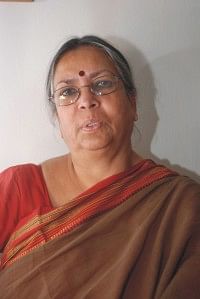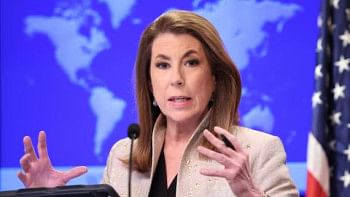'Where are the people now?'

Sultana KamalPhoto: STAR
Human rights activist Sultana Kamal obtained masters degree in English literature from Dhaka University in 1971 and in development studies from Holland, in 1981. Presently the executive director of Ain o Salish Kendra, she was appointed an adviser to the caretaker government in 2006 but resigned with three other cabinet colleagues in December the same year. She received Ananya Top Ten award in 1995 and John Humphrey Freedom Award 1996. Shamim Ashraf took the interview.
How much has the country advanced since 1/11?
In terms of the democratic system, we're stuck in one place and waiting to get it back. When the caretaker government took over, it pledged creating an even-playing field for a free and fair election. It reformed the EC and ACC, reconstituted PSC, and separated the judiciary from executive. However, while bringing the corrupts to trial, they didn't do the proper things in many cases. Under the emergency, the government kept huge power in its hand and used it recklessly and selectively, failing to show adequate sign of judgement.
How do you see the anti-corruption drive?
There were many examples of corruption and people have an idea about those behind these. It was the responsibility of the government and the institutions to bring those into a process through a transparent way before starting the investigation and trial process. But the CTG arrested the suspects before collecting adequate evidence.
Why do you think it happened?
Maybe due to want of skill of the people working in the institutions or maybe there is still some party allegiance. Corruption was so deep-rooted that even those involved in these fields might have benefited from the acts of corruption and so might have frustrated the process from within, and as a result, though cores of taka have been looted and we've seen many people turning rich overnight, we cannot dig out how it happened and take punitive action.
For example, while the ACC was very much there, the government formed the NCC and there was clash of authority between them: who would file the case, who would arrest, whose decision is final, etc. Not only that there was no coordination, but also that one obstructed the other's works. The institutions seriously failed to follow the due process. But the whole process has succeeded to shake some true corrupts. It appeared to us to be true for at least a time that no one is above law.
Would you explain selectivity in the CTG's using its power?
In some cases those who should have been arrested were not. And to avoid arrest in the future, these people are resorting to many kinds of pretension and unjust pre-emptive activities. If any legal move against them is initiated, they would say the government is doing so as retribution.
Some who came out from jail are posing as
if they are clean …
They are posing, but all of them are out either on bail or on health grounds. The cases have not been withdrawn. We can recall how these people earlier turned the judiciary ineffective and used it for their benefit. People are frustrated by how they can use the judiciary this way and they do not consider all of them as clean.
What will happen if charges against them cannot
be proved?
If the charges cannot be proved ultimately for different reasons including weak investigation, they will take the chance to say they never had done any corruption or any crime. And they can even come out victorious in the election, as we've seen in the local government elections.
How much public awareness about corruption was created by the anti-corruption exercises?
A lot. People now know that these corruption incidents are true and have an idea as to who are behind these. It would be better if these elements could be proved guilty in a transparent way through legal procedures. That would be very difficult had the institutions followed the due process from the beginning.
How much has been done regarding political reforms?
It is impossible for the army or CTG government to bring political forces into discipline because their power base is people. It is true that people supported the government for reforms. The state can bring institutional reforms, but the pressure should come from people. The government came as a caretaker of the nation but didn't set up communication with people. There was clear division: the government being on one side with the army (sometimes with the army separate), and the political parties being their opponent. People were totally left out. Politics now stands at the same confrontational and antagonistic state which we strongly opposed. Now antagonism and confrontation is between government plus army and the political forces. Where are the people now?
What could be the proper approach?
Had the government taken people into confidence at the beginning and did everything after consulting with people, such situation wouldn't have arisen. How many times has the government sat in consultation with the people since coming to power? It only sits with the businessmen sometimes and with political parties. Has it seriously sat with the civil society and sought their advice?
What could political parties do?
When we sit with party members on talk shows and point out any mistake, the political leaders blame us, saying we've united with the government and are talking in support of depoliticisation. The parties didn't ask people even once to point out what mistakes they have made. It is very disappointing and frustrating. They never for once said let us sit and address our mistakes together. Have they given any manifesto and asked people what they want? Their only worry is how to participate in election and what condition they would go by.
It is high time for the political parties to interact with the people and get some clue from the people what they want. Let them announce their manifesto. Let the political parties realise their own dignity. Politicians are people whom people trust and give the responsibility of looking after their lives. I hope they'll realise the nobility of this profession and act accordingly.
What are the weaknesses of the CTG?
People could not take any role excepting for the fact that it gave support to the government initially. Besides the incident at Dhaka University, the government tried to bring a balance in political arena and took some unexplainable steps like weighing Hasina and Khaleda as the same, which is not right.
It is true that both of them had many faults, but Awami League was a child in comparison with what the BNP-led alliance government did during its tenure. Trying to bring a balance, the government arrested Hasina as it needed to arrest Khaleda.
As the fundamentalists have a major influence in bureaucracy and army, I think the government could not touch any of the fundamentalist forces. But the Jamaat was a party in the four-party alliance. After warrant of arrest was issued against the Jamaat secretary general, police couldn't find him though he was having meeting with none other than the chief adviser. These created a doubt among people as to whether to support the government any more and what is its intention; they don't consider the government safe anymore. People can neither trust the AL nor the BNP, and now they can't even trust the CTG.
How do you see the Minus-2 formula?
Influenced by different quarters, the government tried to adopt the policy, and it failed because people didn't let it succeed. People were very much against any such policy. The government, at the very beginning, should have tried to understand people's sentiment. People always wanted the people who were responsible for corruption, degeneration, absence of morality in politics to be brought to book and punished. So, people didn't say anything against Khaleda Zia and Sheikh Hasina's arrest. They wanted all politicians including these two to go through due trial process. Without realising that sentiment, the government tried to implement the Minus-2 formula, tried for balance among parties, coaxing the fundamentalists, and distancing both the people and the political parties.
Do you think the government is moving away from its position after realising this?
Yes. I strongly say negotiation and understanding are welcome. But it is dangerous when someone compromises with ethics and principles, which we've seen in the cases of women policy and demolition of sculptures in front of airport. Changes were brought twice to the RPO.
Does that mean the CTG has failed in doing what is aimed at?
I won't say the government has totally failed, but I would say the CTG has failed to work with prudence in many cases. For this, their intentions have been terribly misunderstood. No-one else can be blamed for this.
How would you see no bails to the arrestees for
a long time and procession of bails later?
This makes us say that we don't see transparency, independence, and efficiency in the judiciary. It is clear like daylight that these are happening under executive orders, which is again unfortunate. When the government wanted to start dialogue with the parties, we started seeing a tilt in court decisions to that end.
Do you support president-PM power balance?
In the present system, all the powers are kept in the hands of the chief executive. I think there is a need for balance. Though the president is not elected by the people, he is elected by representatives elected by the people. It would be better if the president could be elected by MPs both from the treasury and the opposition. Another option can be direct presidential election.
Will RPO be able to bring expected change in political parties' culture?
It may not bring expected result, but would definitely ensure some advancement. It will force the political parties for democratic practice inside the party in many cases.
Should emergency be there during election?
We don't think there is a condition in the country which needs emergency, and it is not desirable to run the country always under emergency. If the situation in the country needs emergency, it is the failure of the government, which needs to look at itself to find the reason for it. If the government thinks the criminals would come back once emergency is withdrawn, we would say it has failed to deal with the criminals.

 For all latest news, follow The Daily Star's Google News channel.
For all latest news, follow The Daily Star's Google News channel. 



Comments